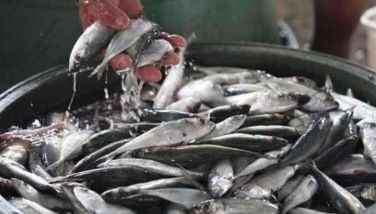Agricultural biases
Growing up, our elders reminded us of that famous line of Max Ehrmann’s prose poem (Desiderata) which admonished us not to compare ourselves with others because we may become vain or bitter, for always there will be greater and lesser persons than ourselves.
However, while we can prevent comparing ourselves with others, we can’t help but do so, when it is necessary, between two individuals holding significant positions and whose policies will have so much influence of our country’s future. We are referring to the leadership at NEDA between Sec. Karl Kendrick Chua (during Pres. Duterte’s term) and incumbent Sec. Arsenio Balisacan.
For instance, last month, as concerns of El Niño started to build up, Sec. Balisacan simply told us that “rice production could decrease by double digits.” That “agriculture’s contribution to the country’s economy as measured by gross domestic product (GDP) is “roughly 10%, so that, “contraction in agriculture caused by El Niño may not deeply impact the economy.” Lest we forget, earlier this year he also expressed “the need for the country to liberalize the agriculture sector to allow the timely importation of crucial farm products whenever necessary.”
Notably, while importation is the immediate default for Sec. Balisacan, seemingly, Sec. Chua had a different approach. To recall, during his term, in justifying the Rice Tariffication Law during a panel discussion, Sec. Chua said that with a growing population, “agriculture has to grow by at least 1.6 percent, preferably, 2 percent or more, otherwise we cannot feed our own people and we will be relying on imports and the price will go up.” He emphasized too that “improving agriculture is the government’s priority in the next three years.”
“In order to improve farming efficiency, the Rice Competitiveness Enhancement Fund (RCEP) provides P10 billion financial aids to around 2.5 million Filipino farmers”, he added. He further said that “the aid needs to be spent for mechanization, productive seeds, and items that improve farming productivity.” Moreover, just to emphasize his preference for agriculture, he stressed that if the proceeds from tarrification go beyond P10 billion a year, the excess will all go to the farmers”.
We agree with Sec. Balisacan that the performance in the agriculture sector will have a minimal impact on the economy. However, apart from just solely relying for imports for our shortages, hopefully, Sec. Balisacan will also have the same degree of preference for the improvement of the agriculture sector. And if ever, he will pick up some points from Sec. Chua and opt for financial assistances, then, probably, we can share a few thoughts or caveats on it.
Giving financial assistance is good, what we should be apprehensive about though is how shall these funds reach the farmers/beneficiaries and in what form. Should it be purely cash or in kind.
If in cash, we already have sad experiences on this. Straightforwardly, records would show that LandBank was always there all these years. For one, on top of the dole-outs and previous financing supports, LandBank had earmarked P198 million for loans in 2009-2012 to ARBs. The project (dubbed as Agri-enterprise Credit and Agri-finance Services or agriCASH) was reportedly “aimed to provide financial services to agri-based enterprises in Agrarian Reform Communities (ARCs) through selected countryside financial institutions, ARC cooperatives, LandBank-assisted cooperatives, and other lending conduits.” Yet, the program failed big time as the performance of the agriculture sector continued to decline.
Therefore, we need to change our approaches. What the government should provide are farm inputs. Simply put, must be in kind. To make sure that these inputs are not sold or placed as bets when they (farmers/beneficiaries) find gambling as another preoccupation, these assistances (whether considered loans or dole-outs) must be closely supervised. Or, in the jargon of the banks, these must be considered supervised loans.
Since these are to be closely supervised, we need a battalion of agriculturists to guide them through. These agriculturists must be employed and under the strict supervision of the Department of Agriculture not with the local government units (LGUs). This is to make sure that LGU executives won’t dip their hands into the cookie jar. Nor can they claim credits for it and make these farmers/beneficiaries their perpetual parasites.
To ensure success, this government must also provide the necessary infrastructure, such as, farm to market roads, irrigation, storage facilities, transport equipment, packing and processing facilities.
With this program done well, probably, the time will come for the agriculture sector to shine.
- Latest




















